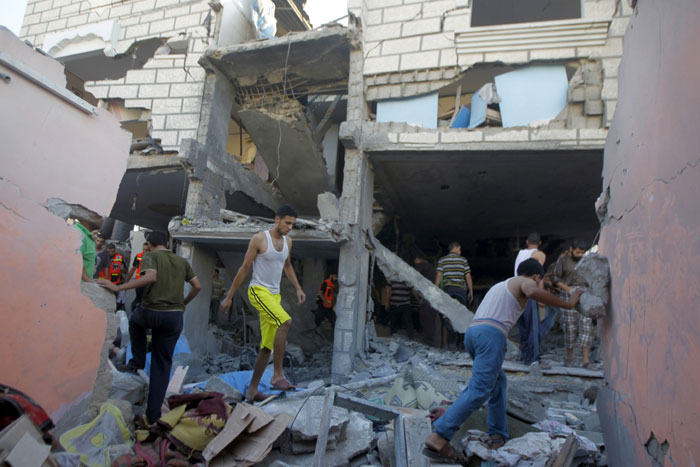Palestinian rescuers search for victims under the rubble of a home which was destroyed following an Israeli air strike on Rafah in the southern of Gaza Strip on Friday. Israeli fire pushed the Palestinian death toll in Gaza to above 800.
Reuters/Gaza/Jerusalem
US Secretary of State John Kerry pressed regional proxies to nail down a Gaza ceasefire on Friday as the civilian death toll soared, threatening to spread Israeli-Palestinian bloodshed to the occupied West Bank and Jerusalem.
With Israel and Islamist Hamas setting seemingly irreconcilable terms for a truce that mediators hope will begin by a major Muslim festival next week, Kerry worked the phones from Egypt while aides made clear his patience was limited.
The urgency was spurred on Thursday by the killing of 15 people sheltering at a UN-run school in the northern Gaza Strip, which local officials blamed on Israeli shelling.
Israel said its forces had come under attack from Palestinian militants in the area of the school and that they had shot back. It accused Hamas of preventing any evacuation.
An Israeli air strike on Friday killed the top spokesman for armed faction Islamic Jihad, a Hamas ally, along with his son, Gaza officials said, bringing the mostly civilian Palestinian death toll to 804.
In the occupied West Bank, where US-backed Palestinian President Mahmoud Abbas governs in uneasy coordination with Israel, some 10,000 demonstrators marched in solidarity with Gaza overnight - a scale recalling mass revolts of the past.
Protesters surged against an Israeli army checkpoint, throwing rocks and Molotov cocktails, and Palestinian medics said one was shot dead and 200 wounded when troops opened fire.
On Friday, Israeli forces went on high alert for flare-ups at a Jerusalem mosque compound during prayers marking the final stretch of the Ramadan holy month.
Israel has lost 32 soldiers in a Gaza ground advance it says aims to destroy cross-border infiltration tunnels used by Hamas to threaten its southern villages and army bases.
Three civilians have been killed in Israel by rocket and mortar attacks from Gaza - the kind of shelling that surged last month amid Hamas anger at a crackdown on its activists in the West Bank, prompting the July 8 launch of the Israeli offensive.
Israeli Prime Minister Benjamin Netanyahu was to convene his security cabinet on Friday to discuss a limited humanitarian truce under which Palestinian movement would be freed up to allow in aid and for casualties to be recovered.
An Israeli official said the Netanyahu government envisages the initial halt to the fighting lasting seven days, during which the army would keep digging up tunnels on Gaza's eastern frontier.
"First Israel wants to hear Hamas's response to the (Kerry) proposals," the official said, adding that some members of the security cabinet also sought assurances that Gaza would be stripped of its remaining rockets under any extended ceasefire.
Hamas had no immediate comment. On Wednesday, its leader Khaled Meshaal voiced support for a humanitarian truce, but only if Israel eased restrictions on Gaza's 1.8mn people.
Hamas wants Egypt to open up its border with Gaza, too, and has demanded that Israel release hundreds of prisoners rounded up by Israel in a sweep of the West Bank last month following the kidnap and killing of three Jewish teenagers.
One Cairo official said next week's Eid al-Fitr festival, which concludes Ramadan, was a possible date for a truce. But US officials were circumspect on progress made by Kerry in the mediation that has involved Egypt, Turkey, Qatar and Abbas.
More than 140,000 Palestinians have been displaced in Gaza by the fighting, many of them seeking shelter in buildings run by the UN Relief and Works Agency (UNRWA).
Eight rockets were launched at Israel from Gaza on Friday, the army said - a slower rate of fire than has been seen in previous days. One was shot down by the Iron Dome interceptor while the rest fell harmlessly wide.
A rocket intercepted near Ben Gurion Airport on Tuesday prompted the US Federal Aviation Administration (FAA) to halt American commercial flights to Israel's main international gateway, with some European carriers following suit.

